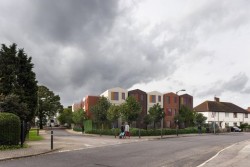The YMCA in London has teamed up with architects Rogers Stirk Harbour + Partners to develop a solution to London’s acute housing shortage using prefabricated residential pods, reports Rod Sweet
‘It’s fun to stay at the Y – M – C – A!’ goes the famous Village People song. This has taken on a whole new meaning for London, where the shortage of affordable housing is so acute that local councils are spending millions putting homeless people up in hotels.
The YMCA London South West has come up with an innovative solution that uses portable, prefabricated residential pods on leased urban brownfield sites to provide starter accommodation for young people unable to pay the high costs of private rent.
The so-called “Y:Cube” units are 26-sq-m one-bedroom studios that arrive on site as self-contained units. Each is constructed in the factory with all services ready for plug-and-play assembly.
According to architects Rogers Stirk Harbour + Partners (RSH-P), who designed the Y:Cube, each unit is constructed from high quality, eco-efficient materials, primarily timber. Thanks to factory-precision assembly the pods are so well insulated that they require little heating, even in winter months, thus cutting fuel bills for residents.
Lined up to manufacture the units is UK firm Inulshell, formed in 2011 as a subsidiary of SIG Group. Inulshell calls itself an innovator in “large-format closed panel structural timber systems”.
The Y:Cube commercial model is also unique for London, where high land prices have made the social housing business unattractive for developers.
The concept involves putting clusters of between 20 and 40 units on brownfield sites that can be leased for as little as 10 years.
Y:Cube “developers” could be housing charities, registered housing providers and local authorities.
The YMCA says that each scheme will have a range of possible funders including housing associations, banks, charitable trusts, social retail bonds and grants.
At the end of the lease period the Y:Cube units – which have a design life of 60 years – can simply be moved elsewhere.
And because the units can be manufactured in high volumes, they’re much cheaper to build – as much as 40% less than a comparable structure built by traditional methods, the YMCA says.
Andy Redfearn, YMCA London South West’s director of housing and development, told GCR that four charitable trusts have so far expressed an interest in funding Y:Cube schemes. He said investors can expect a return of around 5%.
As for available land in London, Redfearn said the concept would suit a variety of sites, in areas as small as 0.25 acres.
Brownfield sites earmarked for big developments like Crossrail 2 would work as well, he said, giving landowners a chance to lease the land during the long-winded planning process.
Original Link - Global Construction Review









